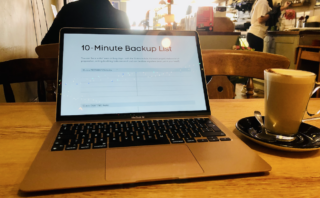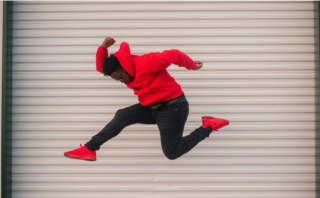Have you ever felt that your days are just dragging on? Then, someone invites you to a 10-day challenge, and you get all excited and start working on your project again? How did that happen?
There’s a reason why challenges help us get stuff done — and once you understand the mechanisms, you can apply them yourself.
When I talk about ‘challenge’, I mean an event that has a clear outcome — run a marathon, write a book proposal, lose weight— and a short expiration date. A challenge is often run by entrepreneurs and coaches to offer a motivational boost and training. Typical challenges are 5, 10, or 30 days long. Good ones have key ingredients that can help you overcome sluggishness and take action.
For example, I’ve taken part in a 10-day book proposal challenge by Alison Jones earlier this year. Instead of just thinking about my new book, I got a daily prompt to write a summary, target audience, bio, outline, and more. I had to mentally engage with my tasks and write down ideas, even though they weren’t going to be perfect. It was amazing. After 10 days, I didn’t just have a proposal draft to send to agents — I had also met lots of other non-fiction writers who cheered me on.
I’ve also joined a 30-day challenge to discover my future self and improve my productivity with Dr. Benjamin Hardy. Each day, I would receive a video with a short task to think about where I want to be in five years — and make a plan on how to get there. During the challenge, it was practically impossible to forget my future plans and get sucked into the daily grind.
I’ve recently run several challenges for artists and creatives myself. For example, I’m currently taking a group of people through a 12-week program of The Artist’s Way by Julia Cameron. The book helps you to overcome fear and the inner critic and to take concrete steps to live a creative life. Most of my participants said that they’ve started reading the book many times, but they never finished. It’s a 12-week commitment after all (quite a long challenge). But in a group, with weekly messages and daily interaction, it suddenly seems possible.
It’s almost magic — only it isn’t. After analysing the feedback from my own challenges, and those I’ve joined as a participant, I’ve found that they contain certain key elements that make it work. Once you know these tools, you can find a way to integrate them into your own life. You can even create your own challenge tailored to whatever you need right now.
You create a strong vision
“The most effective way to change your habits is to focus not on what you want to achieve, but on who you wish to become.” — James Clear, Atomic Habits
Challenges help us to envision our future selves. For example, when we sign up for a book proposal challenge, we see ourselves holding the final document in our hands. When we sign up for a 5-day relationship challenge, we visualise ourselves in a loving moment with our partner. Envisioning your future self is a powerful tool to create motivation and optimism. The more we visualise where we want to be, the more we will take concrete steps.
Challenges help us clarify our goals
“When we are unclear about our real purpose in life — in other words, when we don’t have a clear sense of our goals, our aspirations, and our values — we make up our own social games. We waste time and energies on trying to look good in comparison to other people.” — Greg McKeown, Essentialism
A good challenge will have a clear outcome. For example, National Novel Writing Month (NaNoWriMo) asks writers around the world to commit to a specific word count during November each year. Each and every sports challenge asks you to focus on getting to the finish line, and design your training accordingly. When we sign up for a challenge, we are prompted to focus, set a clear goal, and plan our roadmap to get there. Without such clarity, we just muddle through and wonder why we don’t get anything done.
You overcome isolation
“What we are talking about here is the power of breaking isolation.“ — Julia Cameron, The Artist’s Way
Many challenges involve a community element. Communities are crucial for creative work, no matter if you’re an artist, writer, or entrepreneur. It’s so much easier to write a novel alongside others. It’s so much more interesting to exchange our views and get feedback on a new product from a group. You can train for a marathon by yourself, but it’s often the moment you share your small wins with others that you really enjoy the moment and get inspired.
You measure your daily progress
“Without seeing progress, it’s all too easy to burn out and give up.“ — Dan Sullivan & Benjamin Hardy, The Gap and the Gain
When you join a challenge, the tasks are usually broken down into small chunks — and you can track what you’ve done each day. Measuring daily progress is crucial to keep up the momentum. We are usually very good at remembering what we failed at, or what we haven’t yet done. However, once you measure your progress and your wins every day, you get a huge productivity boost — and most challenges are designed to do just that.
You’re being held accountable
“Knowing that someone is watching can be a powerful motivator. You are less likely to procrastinate or give up.” — James Clear, Atomic Habits
No one cares if you finish your project or not. That’s not entirely true, but we often think that. Especially when it comes to creative work. You can write your book today or you can skip it. You can create a new online course or you can wait until next month. But when you sign up for a challenge, accountability is introduced to your life. You get daily tasks, and someone out there — be it the other participants or the organiser — cares about your progress. In many challenges, an online community will notice when you don’t participate. Your organiser might wait for your submissions to give you feedback. In really good challenges, someone will nudge you so you don’t start procrastinating.
You have a clear start and end date
“You simply focus again on what you really want and take a concrete action, even a small one, that takes you toward the goal.” — Gay Hendricks, The Genius Zone
Uncertainty kills creativity. In contrast, when you have a clear start date for a challenge, you get a re-set moment. No matter how much you’ve procrastinated, you know that on day X you’re going to sit down and start. There is a clear time frame (often 5, 10, or 30 days). Working within this timeframe makes your project, or part of it, seem doable. It’s not a mountain anymore. And you have a wrapping-up moment at the end. For example, after 10 days, you may have drafted a 3000-word book chapter. Even if you still have to work on your project beyond the challenge, the first hurdle is done. And then you can celebrate and use the momentum to keep going.
How to create your own challenge
Of course, the easiest way is to find existing challenges by contacting entrepreneurs, writers, artists, etc. on social media and via your networks — all of us have joined a good challenge at some point, and you can get recommendations.
An alternative is creating your own challenge. See it as an experiment.
Here are the questions you need to answer:
- How long shall this challenge be?
- What is the concrete, measurable output?
- How can I break down the overall goal into weekly or daily chunks?
- How often will I be prompted (daily, weekly)?
- How will I track my progress?
- Who will hold me accountable (accountability partner, friends, a group)?
- Where can I report and share my progress with the world (social media, friends…)?
- What will be my reward for completing the challenge?
Then, create your own challenge as if you were doing it for your clients or friends. You can use an email service to pre-schedule daily messages to yourself (e.g. Spark or FutureMe), or create a small workbook with daily prompts, or a poster.
For extra fun and accountability, ask friends with similar goals to join you in this experiment.
Most of the challenges I’ve run for my clients started from the fact that I was blocked and needed to find a way to finish a project. Why not play around with this idea and tailor your perfect challenge for yourself?
(Photo by Jukan Tateisi on Unsplash)





